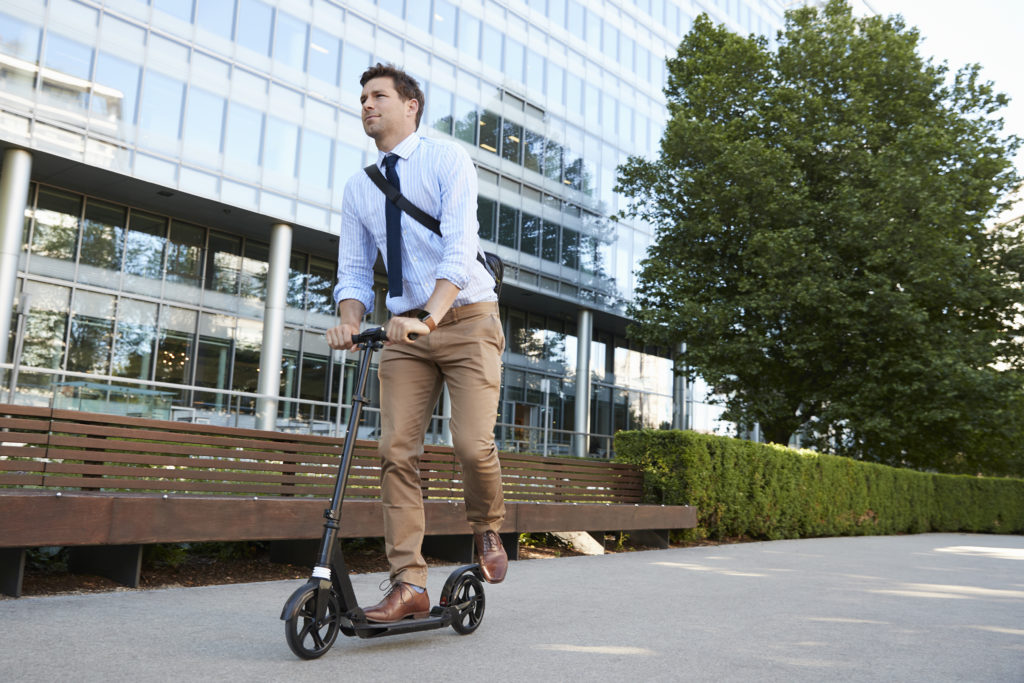
Scooters are coming to Chicago this summer.
Beginning on Saturday, June 15, 2019, the day before Father’s Day, a bunch of electric scooters will start popping up in parts of Chicago’s West, Northwest, and Southwest Sides. The city will be experimenting with a four-month long pilot program to test whether or not scooters will improve access to transportation in Chicago.
Other major cities, including Detroit, Indianapolis, D.C., and San Francisco have already introduced scooter sharing to their streets with mixed reviews. Last year, a couple of scooter companies pulled their fleet from Indianapolis after the city sent them cease-and-desist letters. City officials wanted them off the road until they passed regulations which would grant licenses to companies allowing them to operate within city limits.
The Detroit Free Press reported last year that less than three months after Detroit introduced its first deployment of Bird scooters, countless near-miss accidents had already occurred, with several accidents actually taking place. All of this was prior to two additional scooter companies, Lime and Spin, entering the fold. By late August of last year, Detroit had roughly 500-600 active scooters on the streets. While that number may not seem daunting or pose a significant threat to road safety, it’s important to acknowledge that these scooters are in addition to the thousands of pedestrians, bikes, and cars already making up a significant portion of city streets. While it has been some time since Detroit experienced how difficult it is to maintain these scooters, Chicago is going to quickly learn if they can handle the new additions.
Chicago Must Be Prepared
According to a Chicago Tribune Article penned by transportation reporter, Mary Wisniewski, Chicago wants to avoid people riding drunk or throwing scooters into the river, as they have in other cities. And they absolutely should. Unlike Detroit’s smaller integration of scooters into the city’s transportation options, Chicago’s addition of 2,500 electric scooters into the city is significant. It’s not out of question that incidents will occur. With a population of 3 million people and a city that already boasts a significant amount of bike lanes for a city of its size, the scooters are going to take time for all pedestrians and drivers to get used to.
As everyone in the city will experience growing pains due to the new mode of transportation, there is another critical aspect that should not be overlooked. Who’s responsible? As the CBS Chicago reported, “the terms of service for the scooter companies that are coming to Chicago specifically say that they bear no responsibility for injuries.” From a liability standpoint, any individual injured or involved in any sort of accident with these scooters, will be unable to effectively hold the scooter companies liable, causing those inflicted to be entirely responsible if the scooter user fails to have insurance. With the city and users already aware of the lack of responsibility scooter companies are taking for potential accidents, what more can be done to ensure safety among drivers and pedestrians? The answer may be to look at how individuals have handled bike sharing.
Taking Precaution
As bicyclists in the city already know, biking in such a populated area can be very dangerous. With that being said, as the CBS report acknowledges, the Divvy bikes seen all throughout Chicago have a no-liability clause as well, essentially rendering them the same as the scooters. The biggest difference, which the report cites, is that most individuals know how to ride a bicycle. The same can not be said for scooters. Making matters worse is the fact that the scooters will have a maximum speed of 15mph and be limited to the bicycle lane. This not only makes it critical that bicyclists riding in the bike lane are aware of any quickly approaching scooters, but that scooter users ensure they do not weave between bicycle traffic. Now, imagine being a driver in the city. As we all know, it is illegal to drive in the bicycle lane; however, there are countless areas in the city where right turn lanes require an individual to legally cross through these lanes. With the introduction of the scooters, drivers must be aware of scooters approaching in their blind spots as they turn. Again, the city has had to deal with this for many years, especially since the introduction of Divvy bikes. While it would be great if these scooters could be treated similarly, we must use more caution on the roads and understand that potential problems lie ahead. Keep an eye out this weekend and be aware of your surroundings.
Reader Interactions